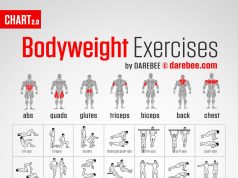In the world of fitness, the glory often lies in the sweat, the grind, and the triumph over one’s physical limits. Yet, as any seasoned athlete or fitness enthusiast will attest, the true art of transformation is as much about recovery as it is about exertion. After the adrenaline fades and the heart rate settles, the body embarks on a crucial journey of repair and rejuvenation. This is where the magic happens—a symphony of cellular restoration that not only heals but strengthens. In this article, we delve into the best recovery practices after intense workouts, exploring how mindful recuperation can elevate your fitness game, prevent injuries, and ensure that every drop of sweat is a step towards a stronger, more resilient you. Whether you’re a weekend warrior or a dedicated gym-goer, understanding the nuances of recovery will empower you to harness your full potential, transforming rest into a powerful ally on your fitness journey.
Cooling Down with Purpose: The Art of Effective Post-Workout Stretching
After pushing your body to its limits, it’s crucial to engage in a cool-down routine that not only aids in recovery but also enhances your flexibility and prevents injury. Effective post-workout stretching is an art form that requires attention to detail and mindfulness. Incorporate these practices to make the most of your cooldown:
- Focus on Major Muscle Groups: Target the muscles you’ve worked the hardest. For example, after a leg-heavy session, dedicate time to stretch your quads, hamstrings, and calves.
- Hold Stretches Longer: Aim for 20-30 seconds per stretch, allowing your muscles to relax and lengthen properly.
- Deep Breathing: Integrate deep, controlled breaths to help release tension and promote relaxation.
- Use Props: Incorporate yoga straps or foam rollers to deepen your stretches and address any tight spots.
Remember, the key to effective stretching is consistency and mindfulness. By dedicating time to this essential practice, you not only support your physical recovery but also nurture your mental well-being, setting the stage for a balanced fitness journey.

Fueling the Body: Nutritional Strategies for Optimal Recovery
After pushing your body to its limits, it’s essential to refuel with the right nutrients to speed up recovery and enhance performance for your next session. Here are some nutritional strategies to consider:
- Protein Power: Consuming a high-quality protein source, such as lean meats, eggs, or plant-based proteins like lentils and quinoa, helps repair muscle tissues. Aim for at least 20-30 grams of protein within an hour post-workout.
- Carbohydrate Reload: To replenish glycogen stores, include complex carbohydrates such as sweet potatoes, brown rice, or whole grains in your post-workout meal. This will restore energy levels and prepare your muscles for future exertion.
- Hydration Harmony: Rehydrate with water or an electrolyte-rich drink to replace fluids lost through sweat. Proper hydration aids in muscle function and helps reduce post-exercise fatigue.
- Antioxidant Allies: Incorporate antioxidant-rich foods like berries, nuts, and leafy greens to combat oxidative stress and inflammation. These nutrients support a quicker recovery and overall well-being.
Balancing these nutritional elements ensures your body gets the essential building blocks it needs to recover effectively, allowing you to return to your workouts stronger and more resilient.

Restorative Sleep: Unlocking the Power of Nighttime Recovery
Amidst the hustle of rigorous workout regimes, achieving a state of restorative sleep becomes an essential pillar for optimal recovery. When you sleep, your body enters a phase of deep repair, working tirelessly to mend muscles, consolidate memory, and regulate hormones. To enhance this natural recovery process, consider integrating these practices into your nighttime routine:
- Consistency is Key: Maintain a regular sleep schedule by going to bed and waking up at the same time each day. This helps to reinforce your body’s natural circadian rhythm.
- Create a Sleep-Inducing Environment: Ensure your bedroom is cool, dark, and quiet. Consider blackout curtains, a white noise machine, or a sleep mask to block out disturbances.
- Mindful Nutrition: Avoid heavy meals, caffeine, and alcohol close to bedtime. Instead, opt for sleep-friendly snacks like almonds or a warm glass of milk.
- Pre-Sleep Rituals: Engage in calming activities such as reading, meditative breathing, or gentle stretching to signal your body that it’s time to unwind.
By prioritizing restorative sleep, you unlock the full potential of your body’s natural recovery capabilities, ensuring you wake up refreshed and ready to tackle your next workout with vigor.

Mindful Relaxation: Techniques to Soothe the Post-Exercise Mind and Body
After pushing your limits in an intense workout, it’s crucial to give both your mind and body the chance to unwind. Embracing mindful relaxation can be a transformative part of your recovery routine, helping to alleviate stress and enhance your overall well-being. Here are some effective techniques to incorporate into your post-exercise cooldown:
- Deep Breathing: Engage in slow, deep breaths to calm your nervous system. Inhale through your nose, hold for a few seconds, and exhale slowly through your mouth. This simple practice can help reduce muscle tension and clear your mind.
- Guided Meditation: Consider listening to a guided meditation track. Whether it’s a focus on body awareness or visualization, this practice can help center your thoughts and promote relaxation.
- Progressive Muscle Relaxation: Starting from your toes and moving up to your head, tense each muscle group for a few seconds before releasing. This technique can help identify and release any lingering tension from your workout.
Incorporating these techniques not only soothes your body but also cultivates a state of mental clarity, allowing you to embrace the benefits of your hard work with a peaceful and rejuvenated spirit.






























